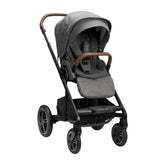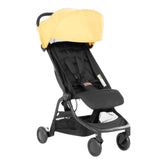Is It Safe to Get Tattoos or Piercings During Pregnancy?

Body piercings and tattoos are a common form of self-expression for millions of people. In fact, about one-third of American women report having a tattoo. For many, a piercing or tattoo is symbolic of something meaningful. It may even be part of a spiritual experience or special ritual. Pregnancy is undoubtedly a special event that many expectant parents may want to commemorate with body art. But is it safe to get a tattoo during pregnancy? Can you get a belly button piercing during pregnancy? What will happen to the tattoos you already have? Can your belly button piercing rip during pregnancy? Let’s take a closer look at what you need to know about tattoos and body piercings during pregnancy.
Is It Safe to Get a Tattoo During Pregnancy?
It’s not recommended.
The major issue with getting a tattoo during pregnancy, according to the American Pregnancy Association, is the increased risk of developing an infection, such as HIV or hepatitis B. Hepatitis B is a severe liver disease that can not only make you extremely sick but can be passed on to your baby during childbirth. According to the Centers for Disease Control, nearly all infants who contract hepatitis B end up with a chronic, long-term infection. In fact, a quarter of these children will ultimately die of related health issues. HIV is also passed from an infected mother to infant in approximately 15 to 45% of cases, compromising the immune system and causing “failure to thrive” in children.
There are other concerns as well. Some parents-to-be have a negative response to the ingredients and metals in the tattoo dye, such as an allergic reaction or infection. Both situations can be exceptionally difficult to deal with when pregnant. In addition, many of the potential risks associated with tattoo dyes are unknown when it comes to their effects on a fetus.

C-section warriors, take note: a nurse and herbalist formulated this balm using a radical combination of organic herbal ingredients traditionally used to help reduce the appearance of scars and stretch marks. The Earth Mama Organics Organic Skin and Scar Balm is crafted with love and science and made with organic herbs and oils, cruelty-free Organic Skin & Scar Balm is here to help cheer your skin on as it does its heroic duty. Scars fade, but you’ll always retain the pride and unique markings of your journey into motherhood. Every scar tells a story. Especially this one.
What If I’ve Already Got Tattoos?
When skin stretches, tattoos can become blurry, faded, or distorted. The areas most prone to change during pregnancy are the stomach, breasts, and hips, as they experience the most expansion. In some cases, stretch marks may develop within the tattoo, causing it to fade.
The extent to which pregnancy affects your tattoo's appearance mainly depends on your genetics. Lotions and creams cannot prevent distortion, but if your skin regains its elasticity after pregnancy, your tattoo may return to its original look. If not, you have the option to have a tattoo artist touch up the artwork or consult a dermatologist who can use lasers to remove it.
Are Henna Tattoos Safe During Pregnancy?
For centuries, women in Egypt, India, and much of the Middle East have embraced the tradition of adorning their pregnant bellies with beautiful henna designs during the third trimester. It is believed that henna brings good luck to pregnancy, ensuring safe childbirth and a joyful baby.

If you're interested in trying this temporary option, it's important to understand that there are different types of henna. Natural and safe henna creates orange, red, brown, cinnamon, brick, chocolate, or coffee-colored stains on the skin, which can last from one to four weeks. Genuine henna does not produce a black color. It is essential to confirm that the artist is using pure and natural henna, avoiding black henna. Black henna is unsafe for everyone, including pregnant women. It contains a substance called para-phenylenediamine (PPD), which can cause burns, blisters, and various reactions that may persist for months. Diagnosis and treatment of these reactions can be challenging.
Is It Safe to Get a Piercing While Pregnant? Is It Safe to Get a Body Piercing During Pregnancy?
Piercing is not recommended when you’re expecting.
During pregnancy, your immune system undergoes significant changes that can hinder the healing process and potentially prevent piercings obtained shortly before pregnancy from fully healing. Even previously healed piercings may become problematic during pregnancy. For this reason, the Association of Professional Piercers (APP) strongly advises against piercings while pregnant.

Moreover, there is a small yet significant risk that any complications, such as infections, could have a negative impact on your pregnancy or fetus. Although the chances are low, it is not worth taking the risk, and according to the APP, any reputable professional would refrain from providing services while you are pregnant. They instead recommend allowing your body to focus on the important, complex, and demanding task it is already undertaking during pregnancy.
What Happens to a Belly Button Piercing During Pregnancy?
Some women choose to keep their navel jewelry in place throughout their entire pregnancy and delivery. Even if a navel piercing has completely healed, it may or may not remain open without jewelry, and this can vary from person to person. If you decide to remove the jewelry entirely, there is a possibility of reinserting it using an insertion taper, even if the old jewelry doesn't easily go back in. If reinsertion is not possible, it is likely that the piercing can be redone.
Interestingly, some women who previously lacked enough tissue or flexibility for a navel piercing may find themselves suitable for it after pregnancy. It's worth noting that there are no specific care requirements for healed piercings during pregnancy.
Wondering how to prevent a belly button piercing from stretching during pregnancy? Consider switching out your current belly button jewelry with a maternity or pregnancy belly button ring. These special rings are crafted from polytetrafluoroethylene (PTFE), a flexible wire that is free of nickel. They are specifically designed to accommodate your body's changes and the growth of your belly. By using these rings, you can help prevent skin stretching and minimize the risk of skin injury.

The Takeaway on Getting Tattoos or Piercings During Pregnancy
Ultimately, the decision of whether to ink up or get pierced during pregnancy is, of course, up to each individual. That said, medical professionals advise waiting until after pregnancy. While the risks are low, they aren’t zero. If you’re planning to nurse your baby, experts advise waiting to get your body art after you’ve finished breastfeeding.
Disclaimer: The information on our site is NOT medical advice for any specific person or condition. It is only meant as general information. Please contact your health provider if you have any medical questions or concerns about your child or yourself.









